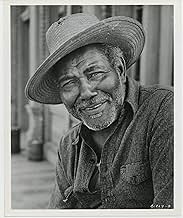AVALIAÇÃO DA IMDb
6,5/10
876
SUA AVALIAÇÃO
Adicionar um enredo no seu idiomaThe story of the country and western singer Hank Williams.The story of the country and western singer Hank Williams.The story of the country and western singer Hank Williams.
John Alban
- Theatre Patron
- (não creditado)
David Armstrong
- Spectator
- (não creditado)
Phil Arnold
- Pie-Eating Contest Barker
- (não creditado)
Larry Barton
- Undetermined Secondary Role
- (não creditado)
Harold Belfer
- Dancer
- (não creditado)
Charles Alvin Bell
- Manager
- (não creditado)
Enredo
Você sabia?
- CuriosidadesElvis Presley was considered for the role of Hank Williams but his first wife, Audrey Williams, vetoed the idea. She felt that Elvis would become the focus of the movie.
- Erros de gravaçãoIn the film, Hank is singing with a medicine show when the "Drifting Cowboys" band finds and recruits him. In actuality, he formed the band himself in 1947.
- Citações
Hank Williams: Woman, who are you to tell me what I am? These are my friends. My kind of people!
- Versões alternativasWhen Turner Entertainment group edited the film for television, Hank Williams' mother Lillie and his second wife Billie Jean were completely removed. Also shown on TV in a colorized version.
- ConexõesFeatured in MGM 40th Anniversary (1964)
Avaliação em destaque
This is an exceptional musical biography of one of the greatest singer-songwriters-entertainers of the 20th century. Single handedly this country boy from the backwoods of Alabama changed American country music and in the process crossed over and changed popular music as well. His influence is still felt today from the legacy of Ray Charles to the driving force of Hank Williams Jr. Surprisingly the lead role in the movie is done quite well by George Hamilton, usually seen as just another pretty face in those days. It is amazing that fourteen-year-old Hank Jr. does such a fantastic job dubbing his dad's music for Hamilton. In some ways his rendition of Hank Sr.'s most poetic song, "I'm So Lonesome I Could Cry," is better than the original. He almost captures all the pain and loneliness of his dad's magnificent voice.
Though there are many liberties taken with Hank Sr.'s life story, the film keeps the spirit of the man and the legend alive and burning brightly. One reason for the biographical changes besides poetic license to make the film more dramatic was the forced reliance on the no-talent Miss Audrey, Hank Sr.'s ex, as adviser for the movie and mentor for Hank Jr. who sang for his father. This led to all kinds of omissions and changes such as no mention of Hank Sr.'s new bride to whom he was married just before his untimely passing.
The latest findings on Hank Sr.'s death, that he died from mixing alcohol and pain killers of the early 50's variety, does not conflict all that much with the ending of the movie. He did die in the backseat of his Cadillac while being chauffeured to a New Year's show in Canton, Ohio.
Undoubtedly he died New Year's Eve 1952 but was not pronounced dead until New Year's Day 1953. Hank therefore has the unenviable distinction of having died in two different calendar years. I was nine years old at the time and I remember that my family (poor country folks from the hills of Arkansas) took it as if it were a death in the family. That is how much of an icon he had become during his few short years of stardom.
So even though the facts of Hank's life may be wrong from time to time in the movie, his spirit is captured making this a great tribute to the man and his music.
Though there are many liberties taken with Hank Sr.'s life story, the film keeps the spirit of the man and the legend alive and burning brightly. One reason for the biographical changes besides poetic license to make the film more dramatic was the forced reliance on the no-talent Miss Audrey, Hank Sr.'s ex, as adviser for the movie and mentor for Hank Jr. who sang for his father. This led to all kinds of omissions and changes such as no mention of Hank Sr.'s new bride to whom he was married just before his untimely passing.
The latest findings on Hank Sr.'s death, that he died from mixing alcohol and pain killers of the early 50's variety, does not conflict all that much with the ending of the movie. He did die in the backseat of his Cadillac while being chauffeured to a New Year's show in Canton, Ohio.
Undoubtedly he died New Year's Eve 1952 but was not pronounced dead until New Year's Day 1953. Hank therefore has the unenviable distinction of having died in two different calendar years. I was nine years old at the time and I remember that my family (poor country folks from the hills of Arkansas) took it as if it were a death in the family. That is how much of an icon he had become during his few short years of stardom.
So even though the facts of Hank's life may be wrong from time to time in the movie, his spirit is captured making this a great tribute to the man and his music.
- krorie
- 15 de out. de 2005
- Link permanente
Principais escolhas
Faça login para avaliar e ver a lista de recomendações personalizadas
- How long is Your Cheatin' Heart?Fornecido pela Alexa
Detalhes
- Data de lançamento
- País de origem
- Idioma
- Também conhecido como
- Your Cheatin' Heart
- Locações de filme
- Empresa de produção
- Consulte mais créditos da empresa na IMDbPro
- Tempo de duração1 hora 39 minutos
- Cor
- Proporção
- 2.35 : 1
Contribua para esta página
Sugerir uma alteração ou adicionar conteúdo ausente

Principal brecha
By what name was Coração Enganador (1964) officially released in Canada in English?
Responda



















